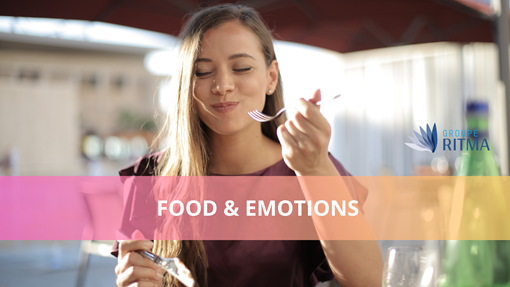
Chronicles
15 September 2023
Food and Emotions

Many people have a conflicted relationship with what they eat. While some “enjoy eating”, others indicate that they “eat very quickly” or that they “deprive themselves of good things”. Not easy! We tend to believe that the problem is liking to eat. But with the philosophy of intuitive eating this paradigm does not hold. In this approach, it is completely natural to take pleasure in eating, to satisfy our hunger, our taste buds, to take pleasure in sharing a meal with loved ones, to taste a variety of foods. Enjoying what you eat is the best way to learn to listen to your hunger and satiation signals.
Eating your Emotions
Guilt often pushes us to eat too much and too quickly the foods we love. These foods that we love so much but don't take the time to taste. Why not take advantage of the moment instead and decide to savour them every time you eat them?
Instead of wolfing down the bag of chips in front of your computer, sit at the table and eat the chips slowly, one by one, slowly and enjoying them to the fullest.
One of the principles of intuitive eating is to experience your emotions without necessarily using food as a crutch. This principle is important because it allows you to undo habits and some automatisms affecting the way you eat.
“Eating your emotions” is a very common defence mechanism. Eating to calm an emotion that we cannot recognize or that we experience in a way that we feel “too intense” to cope with. For the brain this correlation works! Yes, eating gives the impression of feeling better, of comfort. It may not be the most suitable way to manage your emotions in the long term, but in the short term, it seems to work.
The problem is that we confuse the physiological signs associated with emotions with those of hunger.
As several emotions generate a feeling in the digestive system (knot in the stomach, butterflies in the stomach, tight throat, gurgling, etc.) it is easy to understand how this confusion can occur. The first step in addressing emotional eating is to become aware of what you are doing. Eat while trying to be present when you do it. If you eat to satisfy something other than hunger, pay attention to it consciously. That means no computer, reading or TV. It also means sitting at the table to eat. To find other mechanisms to manage emotions, you must first recognize them, then identify them. Eating with this pattern of habits is a defence mechanism, it is important to realize that this is what we are doing. You can contact a nutrition therapist who can support you in this process in order to find the intuitive eater in you!